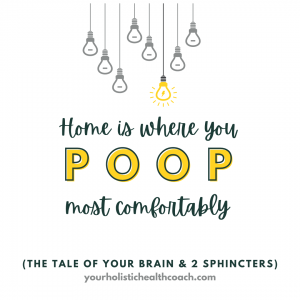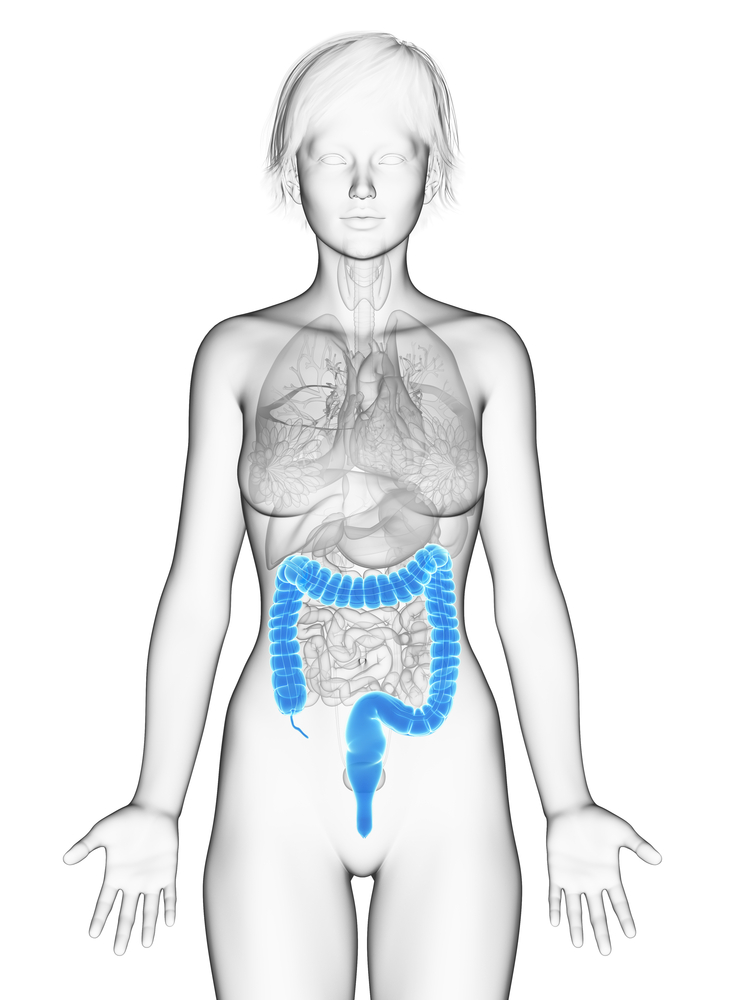by Sarah Lawrence | May 31, 2021 | Digestion, Health, Immune & Inflammatory Balance
Belly bloat is uncomfortable and, often, embarrassing. While some common causes of bloating can be obvious (overeating, drinking carbonated beverages, constipation), others may be more elusive. Whether it’s acute or chronic, it is good to know why bloat is happening. Let’s look at two surprising reasons behind belly bloat that you may not have explored yet. We’ll also cover a few of my best tips for dealing with bloat (no matter what’s the cause.)
 Surprising Reason #1:
Surprising Reason #1:
SIBO. Small Intestinal Bacterial Overgrowth. It sounds complicated… and it is! So often, we hear about using probiotics as a way to ease belly bloat and digestive issues. In SIBO, too much bacteria ends up colonizing the small intestine. Common symptoms include INTENSE bloating after any meal (even water). Nausea, constipation or diarrhea can also occur.
If you’ve ruled out common causes of bloating, see your doctor to check for SIBO. Testing involves a breath test that measures the amounts of hydrogen and methane in your breath over the course of a few hours. Treatment can include dietary modifications and/or a short course of antibiotics.
Surprising Reason #2:
Endometriosis! Persistent gas and bloating is one of the most common things women with Endometriosis encounter. Because these symptoms are commonly caused by other issues, women are often dismissed and given antacids. When the pain and bloating persist or worsen over time, doctors may begin to look for other causes of inflammation in the gut. Still, SIBO and IBS diagnoses are common among women with Endometriosis. If a gastroenterologist has diagnosed you with SIBO or IBS and treatment including specialized diet or antibiotics and it is not working, it may be time to see an endometriosis specialist.
Figuring Out What is Causing Your Bloat
Figuring out what is actually causing you to be bloated can be harder than a 10,000 piece puzzle. While it may seem overwhelming, there are a few things to look at first.
Where is your bloat?
You may think that it’s your stomach causing issues, when the bloating may be coming from your intestines. Take a look at the images below to see if you can determine the location of your bloating or gas pains.
Notice that the stomach is positioned low in the chest cavity or at the very top of the abdominal cavity. In women, the stomach is basically just under your ribcage below your breasts. The small intestine is the next stop after the stomach. If you pain and bloating happens shortly after meals, it may be in your stomach or small intestine. Several hours after a meal may indicate the lower part of your small intestine or the start of the large intestine. Where most people hold low on the abdomen for gas pain is actually intestinal pain rather than stomach!
Digestion begins in the mouth. After chewing, the food bolus travels down the espohagus (long blue tube) and enters the stomach (kidney bean shaped blue pouch under the breasts)
In the stomach, food continues to be broken down by digestive juices. When it leaves the stomach, ideally, food is liquified and considered “chyme” as it enters the small intestine.
Chyme travels into the large intestine. Water is reabsorbed through the colon wall. Bacteria continue to break down food particles and form stool that is excreted through the anus.
Think about your diet.
Are you eating anything new? Is there anything different about when, where or how you eat? Sometimes a new food or a food cooked in a different way can be the culprit. If you normally sit to eat and find symptoms happen when you’re eating on the go or when you’re rushing, then you can likely make simple modifications and ease your symptoms.
Get to know your response.
Do you know how you feel after you eat eggs? How about caffeine, gluten, dairy, sugar, etc? Do certain foods increase your bloating response? Do certain foods increase constipation? Are your symptoms different at various times of the month (hormonal cycles, moon phases, deadlines, etc)? By recording your symptoms along with your intake (food, drink, stress, work, exercise, etc) and output (bowel movements, emotions, energy level, etc) you can begin to assess your body’s response. You can use a notebook or use a form like this one that I use in my practice.
Whether you figure out what’s causing your bloat or need to take the next step and see your doctor, 5-10 days of journaling can provide some insight for your clinician.
Seek support
If your bloating doesn’t ease after some simple shifts then you may want to seek the support of your doctor. A general practitioner can assess your overall health and guide you to a specialist if needed.
Tips for Relieving Bloat
If you’re tired of being bloated all the time, here are a few things that may help:
Chew — Chewing food until it’s liquid is needed for proper digestion. Chew smoothies and soups so your stomach gets the signal that food is coming and so digestive juices are stimulated. Simply slowing down and chewing can drastically help digestion!
Sip still water – Still water (rather than carbonated) may relieve bloat. Avoid drinking too much with meals. Instead, sip during meals.
Get regular exercise – Walking is one of the best exercises to help relieve bloating, but there are also some yoga poses that can be great. Child’s pose, gentle torso twists, etc.
Try peppermint or ginger tea – Peppermint and ginger do wonders for bloating and the gut in general. Try drinking 1-2 cups of either tea each day and see if it helps. Fennel tea can be another ally for gas and bloating. This blend from Traditional Medicinals can be helpful: https://amzn.to/3yKwTGu
Address your medical conditions – Of course, if your bloating is from medical conditions like SIBO, Endometriosis, IBS, Crohn’s or Celiac, then you need to address those before your bloating will ease.
by Sarah Lawrence | Jan 29, 2021 | Digestion, Health
You may be wondering how there can even be 3 reasons to change your diet even if you don’t think you have any digestive problems. I mean, why would you want to change if you think everything is okay?
In the office, I hear it all the time… “I have no symptoms or problems that point to my digestive system, at all. I’m pooping a couple of times a week. Only have occasional gas, no food allergies. My digestion is fine.” So, why would you need to change your diet even if you don’t think you have any digestive problems?
Interestingly, the same people who don’t believe that their digestive system is an issue also talk about headaches. They have missed periods, heavy periods and joint pain. Anxiety, depression, thyroid imbalance and more. Believe it or not, all of those issues can have links to the digestive system and gut health.
What is the Digestive System?
Before we look at reasons to change your diet even if you don’t think you have any digestive problems let’s look at digestion. Here is a primer on the process of digestion and the digestive system.
Where it Begins
Digestion begins in the mouth. Amylase in your saliva begins breaking down carbohydrates. The mechanical action of chewing continues breaking down food to make it easier for your stomach to continue the process. What you swallow is called a bolus.
Once you swallow, it takes about 6 seconds for the bolus to move down your esophagus, past your epiglottis and lower esophageal sphincter into your stomach.
Where Most of the Breakdown Happens
Your stomach does most of the work breaking down what you eat. Protein digestion begins with Pepsin mixing into the bolus. Other stomach secretions are added and continue to liquify the bolus. Now it’s called chyme. Chyme passes through the pyloric sphincter into the small intestines.
In the duodenum (the first section of the small intestine), pancreatic enzymes (lipase) and bile are added to the chyme and fat digestion begins. Bile helps make fats water-soluble by breaking them into fatty acids and glycerols. (This is one reason why people who don’t have their gallbladder can have difficulty digesting fats!) The duodenum is the body’s primary location for digestion and biggest area for breakdown of nutrients.
Where Most Absorption Happens
Chyme moves through the small intestine from the duodenum to the jejunum, and absorption of nutrients begins. Most absorption happens in the jejunum before chyme enters the ileum. However, B12, bile salts and other products of digestion that weren’t absorbed in the jejunum are absorbed in the ileum. The Ileum walls have villi that facilitate absorption and the majority of GALT cells and Peyer’s patches that modulate the immune system.
Where It Ends
The ileocecal value opens the ileum/small intestine to the colon/large intestine. Water and electrolytes are reabsorbed here. Remaining indigestible waste leaves the body through the rectum, out the anus and into the toilet!
Digestion is more than just probiotics and your gut
As you can see from the path we traced, digestive isn’t just about the gut. Organs range from the mouth and salivary glands to stomach, gallbladder, intestines, and anus. Any disruption or imbalance in any step or accessory can cause issues with your health. It may not be that you suffer with constipation or diarrhea or gas, but you may experience fatigue or headaches, acne or joint pain. You may have an autoimmune imbalance or a thyroid problem or mental health challenges. Digestion, absorption, and elimination are all critical to overall health!
Let’s look at 3 reasons to change your diet even if you don’t think you have any digestive problems
According to an article in the journal Gut
The condition and function of the gastrointestinal (GI) tract are essential to our well being. After the respiratory tract, the GI tract constitutes the second largest body surface area, comparable in size to a tennis court. During a normal lifetime 60 tons of food pass through this canal, which is important for well being, but also constitutes an enormous threat to the integrity of the digestive tract and the whole body…
The GI surface is protected by large quantities of important secretions, from saliva in the oral cavity to colonic secretion in the large bowel. These secretions contain factors… for the lubrication of the mucosa and for functions of the GI tract but also hundreds of ingredients of importance for intraluminal microbial defense. The secretory functions are extremely sensitive to foreign chemicals.(1)
Knowing that the GI tract is both very important to health and very sensitive makes it important to protect.
1. Stress, Your Immune System and the Microbiome.
Stress affects the composition of protective intestinal flora. Even if you have no gastrointestinal symptoms, you likely have stress in your life. That alone can impact your health. It is VERY well documented that stress has a major impact on the immune system. 80% of the immune system stems from GALT cells in the intestines. So, protecting your gut with a healthy diet makes sense. (2)
2. Weight Issues and Risk of Disease.
A standard Westernized/American diet is associated with worse microbiome diversity and many accompanying issues, include obesity and other diseases. (3) Releasing excess weight and getting your body to a comfortable and healthy weight for your frame is one way to support your health. Simple dietary shifts and strategies can often help!
3. Mental Health.
Scientists know that there is a link between your gut and your brain. This is the brain-gut connection, or the gut-brain axis. Communication between your gut and brain is a two-way street, involving your immune, hormone and nervous systems.(4) People with gut conditions like IBS or inflammatory bowel disease are more likely to be diagnosed with anxiety or other mental health conditions. Some studies suggest that regulating your gut bacteria could influence your mood and may help to prevent and treat mental health conditions such as anxiety, depression and schizophrenia.(5,6) Autism spectrum disorders are also being studied for links with microbiome diversity and how changing microflora may help.(7,8)
Next Steps
What do you think? Do any of the 3 reasons to change your diet even if you don’t think you have any digestive problems resonate with you? Making dietary changes to help support your microbiome can have benefits. What changes you make depends on your current diet and your unique health circumstance. Are you working with a Functional Nutritionist or Dietician? Ask them what steps make sense for you and your health. If you don’t have nutritional support on your trusted team, reach out and schedule a discovery call with me. We will spend 15-20 minutes together, I’ll listen and ask a couple of questions and then share my thoughts on next steps you might want to explore.
Sources
- “Ecological control of the gastrointestinal tract. The role of probiotic flora” from the journal Gut 1998;42:2–7
- Psychological Stress and the Human Immune System: A Meta-Analytic Study of 30 Years of Inquiry (nih.gov)
- Links Between Immigration, Obesity, and the Microbiome – The Atlantic
- The Brain-Gut-Microbiome Axis – ScienceDirect
- Gut microbiome from patients with schizophrenia modulates the glutamate-glutamine-GABA cycle and schizophrenia-relevant behaviors in mice | Science Advances (sciencemag.org)
- Differences in gut microbiome composition between persons with chronic schizophrenia and healthy comparison subjects – ScienceDirect
- The fifferences between the gut microflora of children with autistic spectrum disorders and that of healthy children | Microbiology Society (microbiologyresearch.org)
- Mental Illness: Brain Disease or Gut Disease? | Psychology Today
by Sarah Lawrence | Dec 3, 2020 | Digestion, Hormones & Neurotransmitters, Mind, Spirit, Emotions
Why your body poops easier when you’re at home
Poop. Every body does it. From Kindergarten, we dive into books like Everybody Poops. We are told that it is normal, natural and nothing to fear. Yet, as we age, poop talk becomes taboo. And the act of pooping feels taboo. We shy away from pooping at work, when we are out at restaurants or even at friends’ homes. Ever wonder why your body poops easier when you are at home? Let’s look to the latest on how gut health (and poop) relates to our circumstance and location.

You may already know that a healthy gut is linked to everything from mental health to stronger immunity. Society is comfortable with why we poop. But the when and how we poop remain fringe topics. After today, I hope we can change that.
German doctor and author Giulia Enders, wrote Gut: The Inside Story of Our Body’s Most Underrated Organ. She gave a TED Talk in 2017 and described why she believes “bowels are quite charming.” Enders discussed a conversation she had with a roommate about bathroom habits and what she discovered about our anatomy that makes it so much easier to poop when you are in your own home.
Click to Read This Related Article: Herbs that Improve Digestion
The Tale of Your Brain and Two Sphincters
Basically, this is a tale of the brain and two sphincters! We have two sphincters that control our bowels. The one we are familiar with is the outer sphincter, which we can control. The inner one, Enders described as having more of a mind of its own. That inner sphincter opens a little bit and releases just enough gas or solid for the sensory cells near the anus to determine what happens next.
“There are sensory cells that analyze what has been delivered,” Enders explained, “and this is the moment when our brain knows, ‘Oh, I have to go to the toilet.'”
Once your brain gets the signal, it begins checking your surroundings and circumstances before deciding if now is a good time to release what is being held back by the internal sphincter. Finally, the outer sphincter and brain coordinate with the nervous cells to push poop back if you are not in a place where you feel comfortable using the toilet.
Control, Coordination and Communication
The control and coordination involved in the process is something that gave Enders a deeper respect for her body and digestive process. If we reframe the feeling of needing to poop from being something embarrassing to being a biological cue, then we may be able to tap into that same respect. By tuning into that feeling, Enders thinks of the inner sphincter as “putting a suggestion on her daily agenda.”
What would happen if we begin being more respectful of that smart sphincter’s suggestion? While we have the option of putting that suggestion on hold, we also have the option of listening to our body and responding promptly.
In her book, Enders notes that waiting to poop when you have the urge can mess with the communication between the two sphincters. Always delaying or denying yourself the ability to poop when the urge hits is what can create the disconnect. There is no harm in occasionally holding off until you can reach a convenient bathroom!
Respecting Cues
That said, I talk with clients every day about poop, digestion, and nutrition. Most people do not have any issues respecting their body’s hunger and thirst cues, sex drive, feelings of sleepiness, need to urinate or need to vomit. While some of those cues are more pleasant than others, it makes me wonder why we have made poo so taboo. After all, we teach our toddlers that Everybody Poops. Even though we now know why your body poops easier when you’re at home, it doesn’t mean that pooping away from home has to be a challenge! We need not be so wrapped up in embarrassment about something so universal, simple, and healthy!
As your Functional Nutritionist and Holistic Health Coach, I would much rather you pop into the public bathroom, work toilet or a friend’s guest bathroom and poop when you need to, than hold out and create a belly ache or constipation. Embrace your inner 2-year-old, poop when you need to! When you walk out of the bathroom, do it with a smile and the knowledge that your body is amazing and your bowels are major players in your health and well-being. If more of us normalize normal bowel habits then the days of blaming farts on the dog and feeling embarrassed about this basic, critical bodily function will be long gone. Wanna join me in a #pooprevolution?
Here’s the thing… I know it is not always practical or possible to poop when the urge hits. I also know that withholding and delaying bowel emptying can result in all kinds of distress. If you are struggling with digestive challenges, click my email at the top of the page and reach out. Depending on your exact circumstances, we can either work out a plan together or partner with a Pelvic Floor Physical Therapist, like my colleague at the NH Health & Wellness Center, Falguni Vashi PT, DPT, PRPC. Do NOT let bowel and pelvic issues wreck your life. We can help.
 Surprising Reason #1:
Surprising Reason #1:



